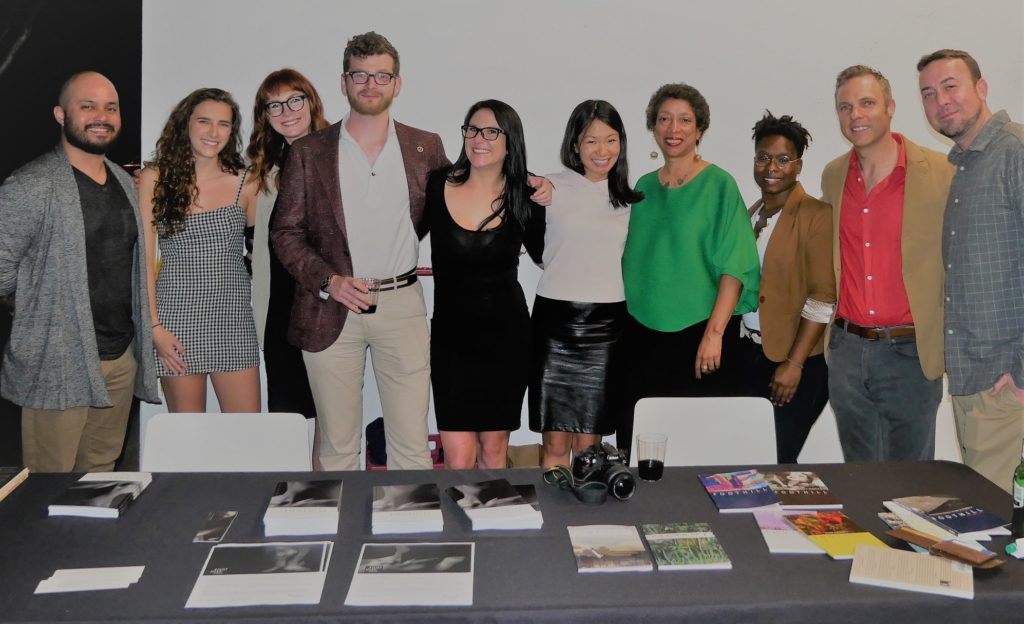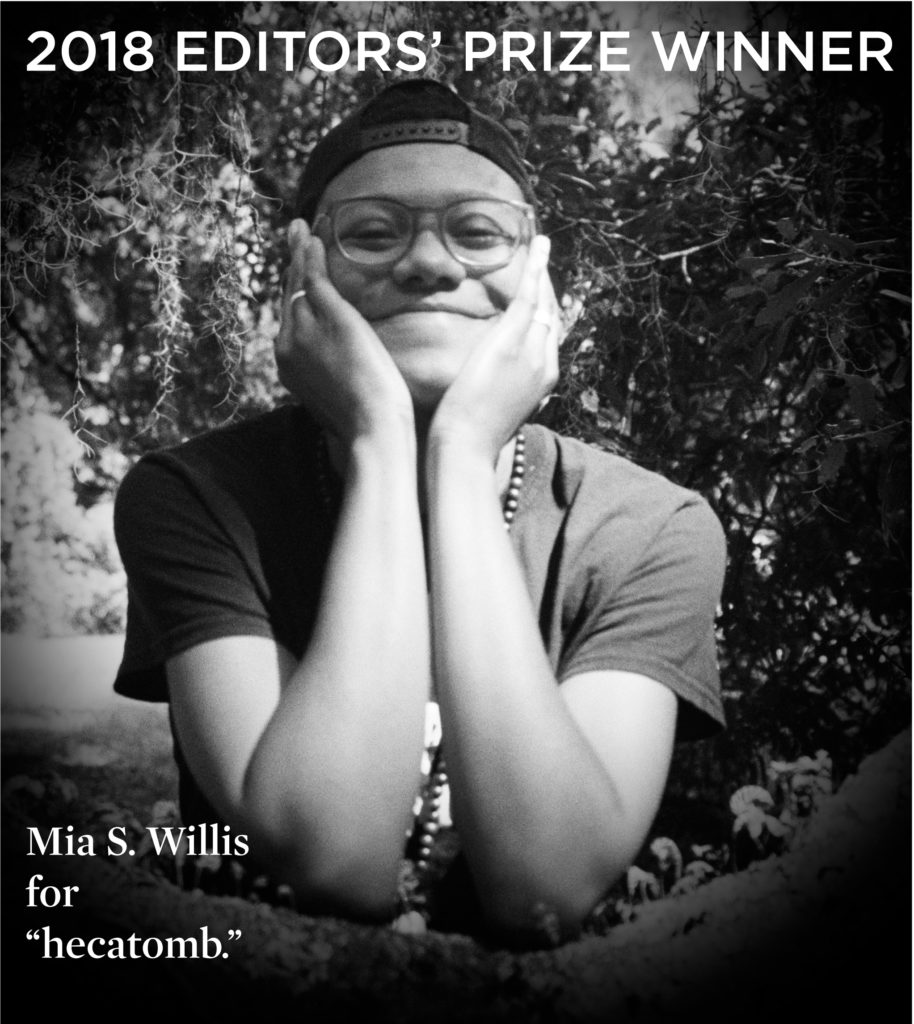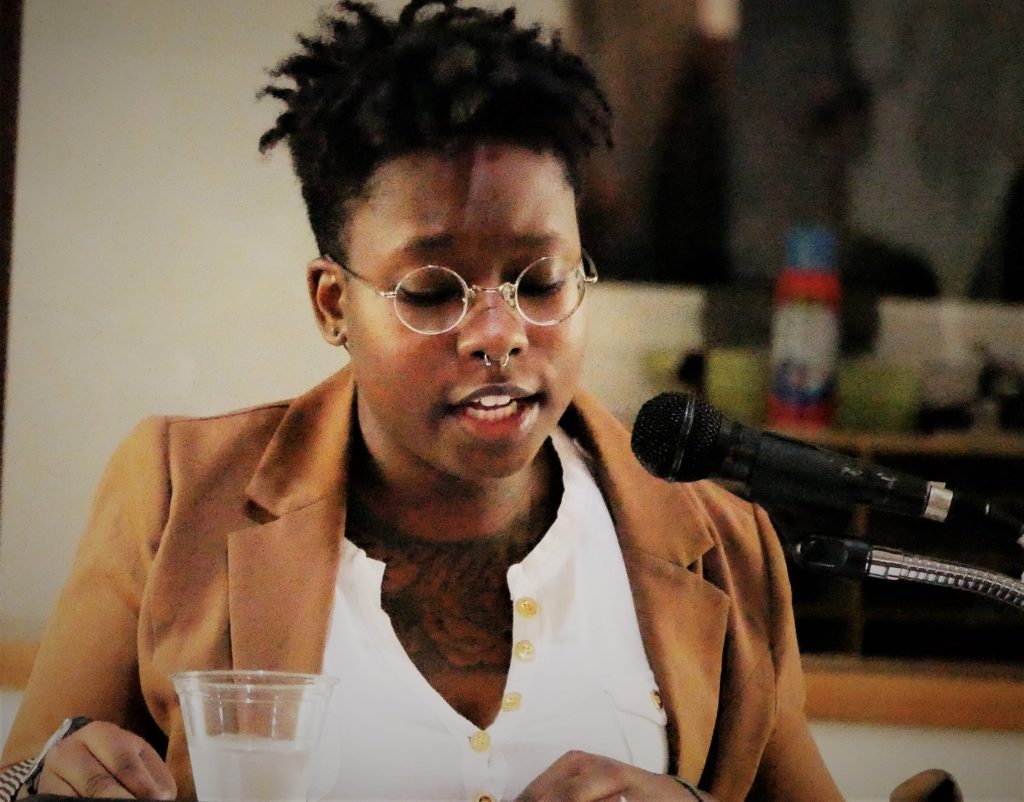Foothill Feature: Ashanti Anderson & Mia S. Willis

Last semester I wrote about the pleasure of becoming folded into the community of poets who write for and produce CGU’s in-house poetry journal Foothill Poetry Journal. As grad student editors, we all feel very lucky to read and amplify our peers’ words; we take delight in following their growth and celebrating the art these poets continue to make and the acclaim and appreciation they receive. This month, I want to extend this celebration just a bit with another post highlighting two exceptionally talented young Black artists.
Mia S. Willis
2018 marked the inauguration of the Foothill’s Editors’ Prize, which went to an especially deserving poem “hecatomb.” by then-Florida State master’s student, Mia S. Willis. The poem begins “i woke up this morning on fire” and moves through metaphorical and literal flames as it ponders living, loving, dying as a Black, femme, queer person in the Florida heat. In a world that feels and has felt more acutely on fire over the past twelve or so months, Willis’s poem reminds us of the quotidian emergency of being in a certain body in America:
i woke up this morning skin melting into bed sheets.
which is to say that i woke up
black and femme in florida.
Undeniably powerful on the page, Willis’s talent as performance artist is just as notable. They have continued to earn acclaim for their spoken word in addition to their written poetry, winning several poetry slam titles in recent years. Here you can watch Mia performing “hecatomb.” in 2018, at the aptly named Capturing Fire poetry slam.
Willis’s talent for exploring the depths of unsaid truths through the force of metaphor is obvious in “hecatomb”:
i woke up crying for the firefighters and the water
in their hoses instead of running from it and
ain’t that a metaphor?

They craft intricate metaphors that produce new tension and make room for complex emotions and contradictory. From “Brunch,” published last October in the literary journal The Offing: “so heaven is a white lie ground between my teeth. / a steaming truth screaming the mo[u]rning awake.”
Since appearing in Foothill, Willis’s chapbook monster house was published with Jai Alai Press in 2019, and won the Cave Canem Foundation’s Toi Derricotte & Cornelius Eady Chapbook Prize, selected by 2019 Kingsley Tufts Award winner Dawn Lundy Martin, who wrote of the chapbook: “Willis’s heroic accomplishment . . . lies not in the articulation of the Black queer person’s subjugation, but instead in the looking toward some other way, toward Black boyness as spiritual possibility instead of a foreclosed body.”
As Martin says, Willis’s poems contain energy that forces open a space for alternative, exhilarating ways of being, in resistance to or outside of conditions of oppression. Histories and presents of death, precarity, captivity are connected to an opening up of the imaginary and the possible. In “an interview with olóòkun,” published in the New Southern Fugitives literary journal in January 2020, Willis expels whiteness and gender binaries out of the space of the poem, alongside/with the help of Yoruba language, figures and spirits:
white person asks me what my pronouns are, so ṣàngó awakens and we evict them together.
chase them through the sugar cane and cotton prisons they thought could hold òrìṣà.
. . .
eat yams until my gender is edo again;
until “they” shreds “he” and “she” into “așǫ oke.”
Ashanti Anderson
Accompanying Willis in volume 8 of Foothill were two poems from another young talent, Ashanti Anderson. Anderson’s poems “Cleaning Up Men’s Messes” and “Mamie Till on Carolyn Bryant’s Confession,” both center the labor of Black women—work that often goes unexplored and unnoticed in the wake of violence—and the knowledge of the world that this work both provides and demands. From “Cleaning Up Men’s Messes”:
I’m always fussing them for even how they walk, sliding their feet,
Sliding the rug with them, curling up the corners with their toes.
I just don’t want them to trip and fall over it, find the cold-blood
Stain on the carpet beneath, seeped in because I grieved long before
These poems both contend with the effort, emotional and physical, of providing care in the face of hatred and indifference. Cleaning up blood and patching ripped shirts are fragile shields against an ongoing onslaught of violence, but these poems also celebrate the power this work has to sustain a community in the face of violation: “I built this / House with the bricks thrown through my window.”

Since Foothill, Anderson has earned her MFA and her work continues to make exceptional work that you can find in many places online and in print (her website has a comprehensive list of publications and other work). In many poems she explores how histories parallel and create moments in the present and future, as in the brilliant piece “If,” which appeared in the autumn 2019 issue World Literature Today. Juxtaposing the stories of Lady Godiva on her horse in 1040 and Sandra Bland stopped in her car in 2015, with a series of conditional parentheticals, “If” creates and explores the connection between the two women, what their bodies could or couldn’t do, wrestling with myths of femininity and realities of Black womanhood.
Lady Godiva traversed the city bare (if many wars ago)
hitched hips to horse (as if a lover)
the same day Sandra Bland was arrested (might if a woman ride a thing
she not be driven beneath it?)
Anderson’s lyrics seem to always manage to pierce to the heart of difficult questions, confronting complicated pasts and realities to bring them into some kind of relief; as her poem “Slave Ship Haibun” posits: “It is impossible to be at peace without understanding it.” “Self Portrait as Kendrick Lamar, Laughing to the Bank,” which appeared in the June 2020 issue of Poetry Magazine, contends directly with the dilemma of achieving success as a Black artist writing through one’s pain in a system predicated on subjugation and death of certain people: “I tell God I understand and what I mean is / I’ve noticed good people must die to let/ there be light in my house.”
Anderson’s first book of poems Black Under is forthcoming from Black Lawrence press in fall of 2021. You can follow her on socials and/or check sign up for updates on her website!
We are lucky at Foothill to have these poets’ words in our journal, and even luckier to have more and more of their words out in the world. During this month, when the United States recognizes Black History, Willis’s and Anderson’s work can speak to how this history continues to create our present and can teach us how to face and create the future.
—Lilly Fisher
P.S. Anderson’s new collection, winner of the spring 2020 Black River Chapbook Competition, Black Under, is available for preorder here!
Share